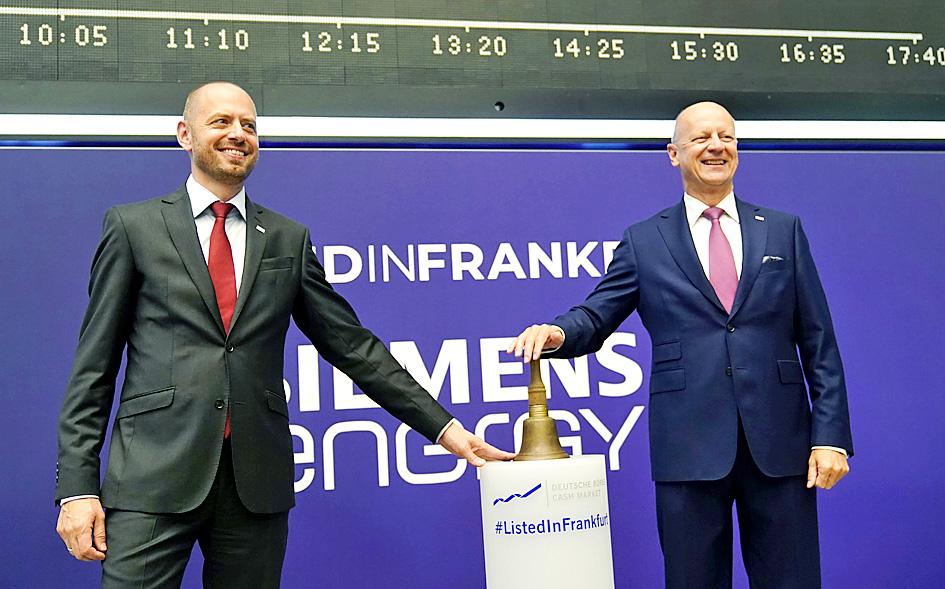German industrial giant Siemens AG yesterday spun off its energy unit, raising just under 16 billion euros (US$18.61 billion), in one of the largest stock market debuts in Europe this year.
Shares in Siemens Energy AG traded at 22.01 euros at open, before sliding back to 19.91 euros at 7:13am GMT, lagging expectations.
Analysts had predicted the new company’s market cap to reach between 17 billion and 24 billion euros. In March, Siemens said that the energy unit had equity of about 17.3 billion euros.

Photo: EPA-EFE
“As an independent company, we now have the entrepreneurial flexibility we need to help shape the global transformation of the energy markets in a sustainable and economically successful manner,” Siemens Energy’s chief executive Christian Bruch said.
Despite the COVID-19 pandemic upending business plans worldwide, Siemens pressed ahead with the spin-off first announced in May last year.
Siemens Energy, with its oil and gas, turbines, power transmission and related services businesses, joins medical devices arm Siemens Healthineers AG and lightbulb unit Osram AG on the stock market, which debuted in 2018 and 2013 respectively, as Siemens slims down to become more agile.
Siemens chief executive Joe Kaeser in 2017 said that he wanted the company to become a “fleet of ships” rather than an awkward tanker, as it seeks to chart a course through a more challenging time for industrial companies.
Other sprawling German conglomerates such as Thyssenkrupp AG, Bayer AG and Continental AG have similarly spun off units to face a fast-changing trade climate, digitalization and cheaper metal imports from China.
The energy unit, which employs 91,000 people, has struggled in the past few years and last year announced 2,700 job cuts worldwide. It generated revenue of 28.8 billion euros in fiscal year 2019.
The conglomerate has proved broadly resilient to the pandemic, beating expectations with net profit of 539 million euros in the three months to the end of June.
As part of the spin-off, Siemens is to give 55 percent of shares in Siemens Energy to its shareholders at a ratio of one Siemens Energy share for every two shares in the main company. The company’s pension fund would receive 9.9 percent, with the parent company holding on to 35.1 percent.
Siemens intends to reduce its shareholding significantly within 12 to 18 months after the completion of the spin-off, it said.
In a peculiar quirk, the spin-off would temporarily raise Germany’s blue-chip stock index to 31 names from its normal 30. Siemens Energy will drop off the DAX after close.

To many, Tatu City on the outskirts of Nairobi looks like a success. The first city entirely built by a private company to be operational in east Africa, with about 25,000 people living and working there, it accounts for about two-thirds of all foreign investment in Kenya. Its low-tax status has attracted more than 100 businesses including Heineken, coffee brand Dormans, and the biggest call-center and cold-chain transport firms in the region. However, to some local politicians, Tatu City has looked more like a target for extortion. A parade of governors have demanded land worth millions of dollars in exchange

An Indonesian animated movie is smashing regional box office records and could be set for wider success as it prepares to open beyond the Southeast Asian archipelago’s silver screens. Jumbo — a film based on the adventures of main character, Don, a large orphaned Indonesian boy facing bullying at school — last month became the highest-grossing Southeast Asian animated film, raking in more than US$8 million. Released at the end of March to coincide with the Eid holidays after the Islamic fasting month of Ramadan, the movie has hit 8 million ticket sales, the third-highest in Indonesian cinema history, Film

Taiwan Semiconductor Manufacturing Co’s (TSMC, 台積電) revenue jumped 48 percent last month, underscoring how electronics firms scrambled to acquire essential components before global tariffs took effect. The main chipmaker for Apple Inc and Nvidia Corp reported monthly sales of NT$349.6 billion (US$11.6 billion). That compares with the average analysts’ estimate for a 38 percent rise in second-quarter revenue. US President Donald Trump’s trade war is prompting economists to retool GDP forecasts worldwide, casting doubt over the outlook for everything from iPhone demand to computing and datacenter construction. However, TSMC — a barometer for global tech spending given its central role in the

Alchip Technologies Ltd (世芯), an application-specific integrated circuit (ASIC) designer specializing in server chips, expects revenue to decline this year due to sagging demand for 5-nanometer artificial intelligence (AI) chips from a North America-based major customer, a company executive said yesterday. That would be the first contraction in revenue for Alchip as it has been enjoying strong revenue growth over the past few years, benefiting from cloud-service providers’ moves to reduce dependence on Nvidia Corp’s expensive AI chips by building their own AI accelerator by outsourcing chip design. The 5-nanometer chip was supposed to be a new growth engine as the lifecycle